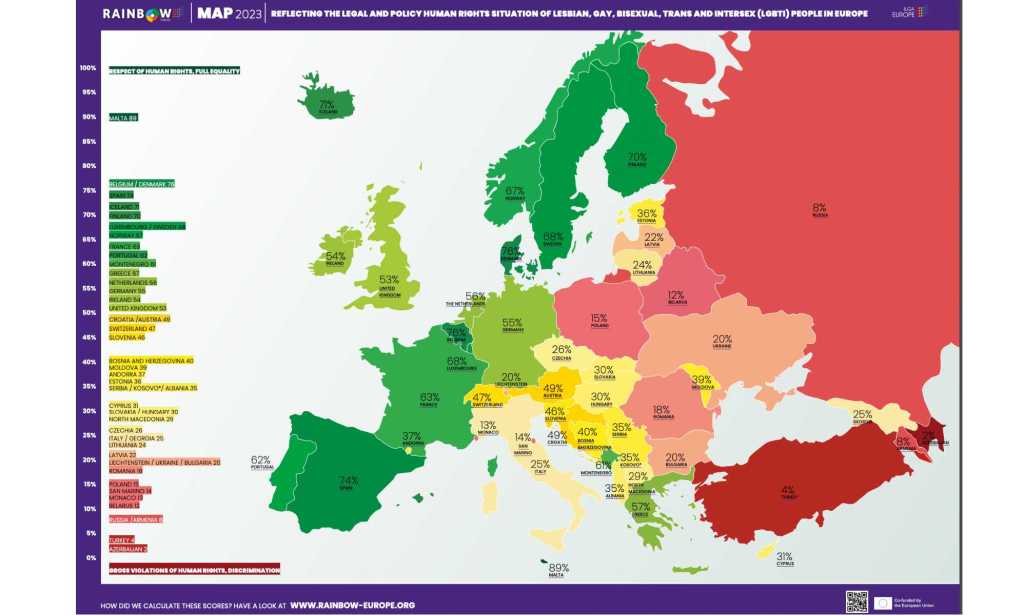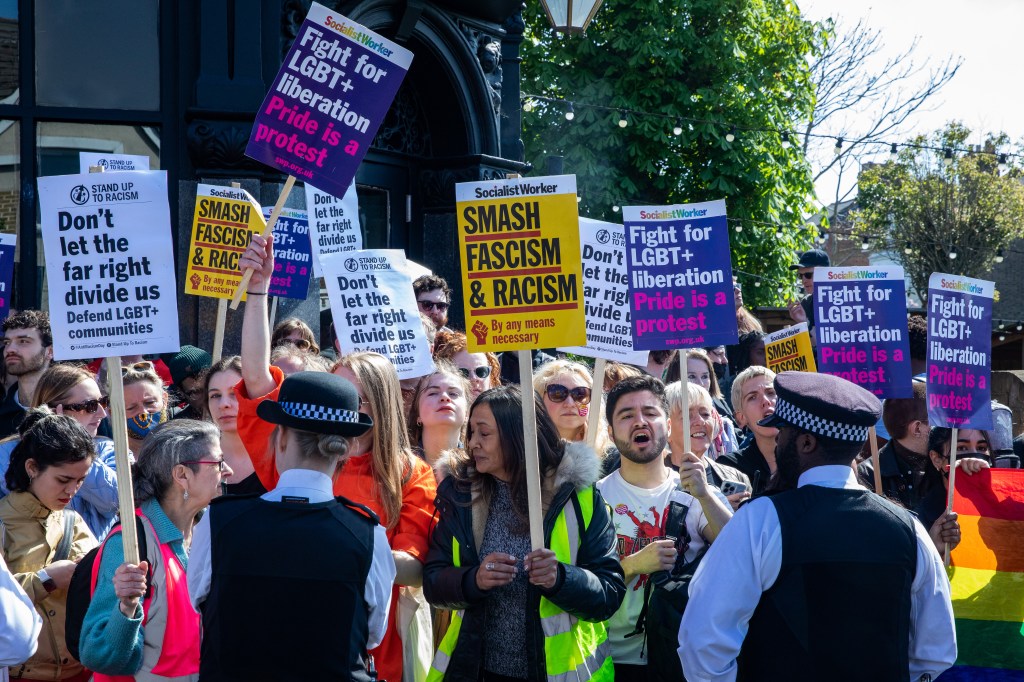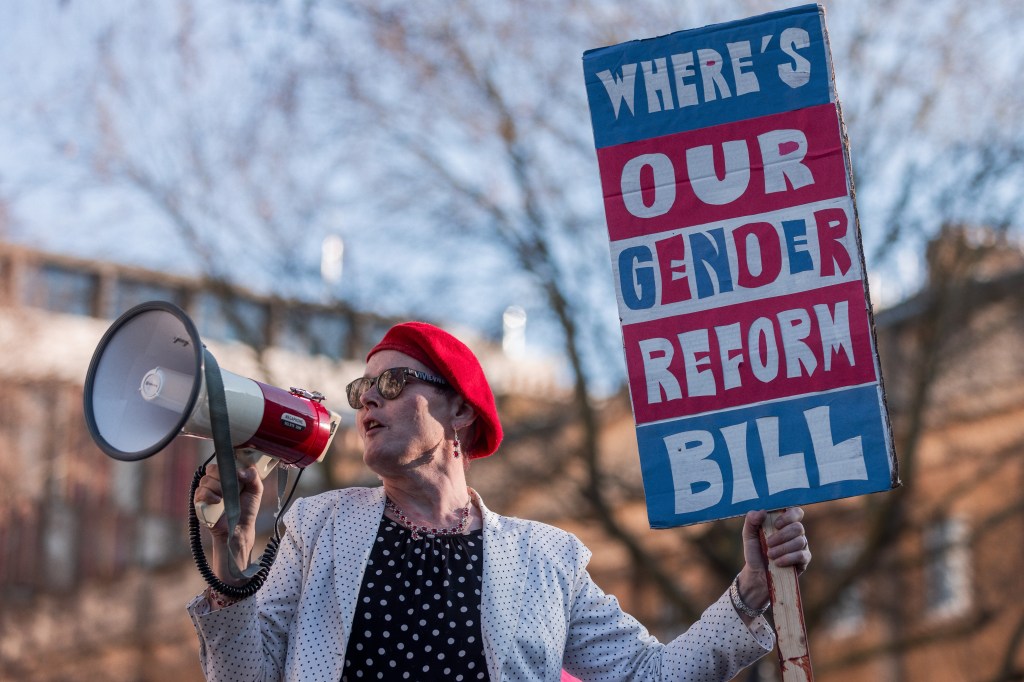UK was once ranked the most LGBTQ-friendly nation in Europe. This year, it’s not even close

The UK has once more dropped down the list in IGLA Europe’s annual Rainbow Map (Envato / PinkNews)
The UK has once again plummeted down the rankings of the annual Rainbow Map that reveals how LGBTQ-friendly European countries are – a development activists have branded shameful and chilling.
The Rainbow Map and Index is released each year by ILGA-Europe and has ranked all 49 European nations on their “legal and policy situation” with regards to LGBTQ+ rights since 2009.
The 2023 Rainbow Map shows that the United Kingdom has once again dropped down the list, from 14th in 2022 to 17th this year.
Up until 2015, the Britain was consistently ranked the most LGBTQ+-friendly place in Europe and was leagues ahead of other nations in terms of rights, protections and freedoms afforded to queer people.
However, from 2016 onwards, the Conservative-led country has continued to drop down the list each year and now has a score of just 53.37 per cent in terms of LGBTQ+ rights.
This is down from the dizzy heights of 86 per cent in 2015.
Countries ranked by ILGA-Europe are marked across seven categories: equality and non-discrimination, family, hate crime and hate speech, legal gender recognition, intersex bodily integrity, civil society space, and asylum. Within these categories specific policies, political developments, community incidents, legal cases and cultural movements from each country are examined.
The results are then used to create an overall list, positioning different nations on a scale between 0 per cent (gross violations of human rights, discrimination) and 100 per cent (respect of human rights, full equality).
In essence, the rankings showcase which countries are the best for LGBTQ+ rights and which are the worst.

The in-depth report revealed anti-trans rhetoric has caused “serious damage” to the UK’s ranking again in 2023, with ILGA-Europe citing “hostile reporting” by mainstream newspapers, trans sports bans, former prime minister Boris Johnson excluding trans people from the promised outlawing of “conversion therapy”, and the anti-trans group, LGB Alliance, achieving charity status.
Hate crime rates in the UK were also described as having reached “dramatic numbers”, with homophobic hate crimes increasing by 41 per cent and transphobic crimes by 56 per cent in England and Wales – the “starkest” such increase since 2012.
The report also specifically noted the continued stalling of legislation which would see so-called conversion therapy banned for good. ILGA-Europe cited the debacle where Johnson planned to drop the ban, did a U-turn, only to exclude trans people, then for the government to backtrack again and say trans people will be included in a ban.
However, the report did highlight research which has shown the attitudes of the general public are not in sync with the “hostile political discourse against trans people”.
Data collected by More in Common suggests most Britons have a “live-and-let-live approach”, in which they would reject US-style bans on drag and believe trans women are women, and trans men are men.
Offering recommendations for improvement, ILGA-Europe said the UK needs to ban conversion therapy for LGB and trans people, adopt a “fair, transparent legal framework for legal gender recognition”, based on self-ID, and monitor and report the experiences and outcomes of LGBTQ+ asylum seekers.
Malta remains trailblazer for LGBTQ+ rights
Elsewhere in the rankings, Malta came out on top for the eighth year in a row, with a score of 89 per cent.
The island nation, with a population of little more than 500,000, has made huge strides in recent years towards LGBTQ+ equality and, despite only legalising same-sex marriage in 2017, has some of the most progressive legislation in the world.
At the bottom of the list, in 49th place, sits Azerbaijan, with a score of just two per cent.
ILGA-Europe has serious concerns about the state of LGBTQ+ rights in Azerbaijan, which is located at the junction of Eastern Europe and Western Asia.
The report outlines hate speech and says violence remains a “serious issue” in the country, with nearly two-thirds of media coverage analysed having hateful or biased content against LGBTQ+ people, as well as several cases of the murders of, and abuse against, queer people.
Activists blast UK result as ‘matter of grave concern’
Charities and activists were quick to criticise the UK for its rapid descent down the list, something they place at the feet of the Tory government.
Robbie de Santos, the director of communications and external affairs at Stonewall, said: “The UK government could once lay claim to having world-class laws for LGBTQ+ people, but no more. This year’s report shows that our European neighbours continue to surge ahead while the UK stagnates.
“The next government has the potential to get the UK back on track. Our party leaders must seize the opportunity to unlock the potential of all LGBTQ+ people across the UK.
“But, for now, it’s vital that the government delivers on its promise to ban conversion practices, and removes its block on the Scottish Gender Recognition Reform Bill, to ensure it is at least ending the stagnation.”
In response to the report, a spokesperson for the government’s equalities department told PinkNews that the UK has a “proud history of LGBT rights” and “one of the world’s most comprehensive and robust legislative protection frameworks for LGBT people”.
They went on to say: “We have already taken great strides, including the publication of our HIV Action Plan, the founding of our Conversion Practice Victim Support Service, and the extension of same-sex marriage to Northern Ireland.”
The Equality and Human Rights Commission, the UK’s human rights watchdog which recently argued for making ‘sex’ mean ‘biological sex’ under the Equality Act, said it was “disappointing” to see the UK drop down the rankings. Adding it recognises “there is still much more to be done to help achieve a fairer society for all”.
The watch dog said it has long argued for the banning of conversion therapy, sought to protect LGBTQ+ from discrimination and spoke out against the government’s Illegal Migration Bill.
“Our job is also to explain the law, which can be complex in relation to sex and gender,” a spokesperson said, “Where the rights of different groups may conflict, we have a duty to advise on how best to strike an appropriate balance. In some cases we do so in areas of law that can attract strong views and disagreement. We provide this advice impartially, even when matters might be contentious.
“We will continue to work with and listen to the views of all people, including those who are lesbian, gay, bisexual and trans, to ensure we can protect the rights of everyone.”
The government’s views were not echoed by Labour MP Nadia Whittome, who described the UK’s continuing fall down the rankings as “shameful”.
The MP for Nottingham East added: “LGBTQ+ rights in this country have stalled, and, particularly for trans people, are now under attack. The blame for this lies squarely at the government’s feet.
“Instead of stoking a culture war against marginalised people, it should ban conversion therapy, de-medicalise the Gender Recognition Act, improve trans healthcare and welcome LGBTQ+ refugees.”

Queer Christian and former government advisor Jayne Ozanne, who is also a conversion therapy survivor, agreed that the government was to blame for the UK’s faltering position.
“The fact that the UK is plummeting down the ranking scale on human rights in Europe should be a matter of grave concern for all those committed to a fair and safe democracy,” she told PinkNews in a statement that she also tweeted.
“What is even more worrying is that this drop has been fuelled by the actions of those tasked with upholding and progressing our rights, particularly the inaction by government in delivering on key pledges to improve our safety.
“At least the rest of world can now see what is happening in the UK – and I hope will try [to] hold our ministers to account.”
Amy Ashenden, the interim chief executive of LGBTQ+ young people’s charity Just Like Us, told PinkNews that the UK’s position sent a “horrific and chilling message” to LGBTQ+ young people who “need to see that it’ll be possible for them to live a happy and safe life in the UK”.
She went on: “Unfortunately, the drop in ranking is not surprising, given the toxic comments made about trans people in politics and the media in the UK over the past few years.
“The anti-trans language that politicians and media spokespeople use has led us down a depressing and dangerous path as a society: rising anti-LGBT+ hate crime, no full ban on conversion therapy, and the policies we’ve all seen floated are a knock-on effect of this, causing direct harm to trans young people in particular.”
Ashenden also called for better support for young queer people in schools, where they still face bullying and hear slurs on a daily basis.
Charities are not seeing ‘commitment’ from politicians
A spokesperson for trans children’s charity Mermaids noted the “rapid rise in anti-trans rhetoric and hate crime, attacks on trans legal rights, and concerns over reduced access to healthcare and supportive education” as having an impact on the UK’s placing.
“We hear every day how these shifts are making life harder for trans youth and their families, who just want to live their lives without shame or discrimination. Mermaids will continue to challenge these injustices and improve the lives of trans young people and their families,” the spokesperson said.
Leni Morris, the chief executive of LGBT+ anti-abuse charity Galop, expected many LGBTQ+ people “not [to] be surprised by the UK’s lower ranking”.
She explained: “At Galop, we work with thousands of LGBT+ people experiencing abuse and violence every year – and what we are seeing is a system in this country which is failing LGBT+ people.”
Morris described how the charity is seeing higher numbers of people, particularly trans and non-binary people, seeking help in the wake of anti-LGBT+ hate crimes.

But, she added, there are very low prosecution levels against perpetrators, and hate crime legislation is in dire need of reform.
“We see our trans clients deliberately dehydrating themselves to avoid having to use public toilets, even in heatwaves, as a result of the current anti-trans narratives in the media and public life,” Morris said.
“We see victims of conversion practices remaining unrecognised and unsupported under the law and by the institutions that are meant to protect us. We see clear evidence of institutional homophobia and transphobia in the police and criminal justice systems, as highlighted by the Casey Report earlier this year.
“What we do not see is a commitment, or action, from ministers to ensure that LGBT+ people are safe and supported, as everyone should be in this country.”

